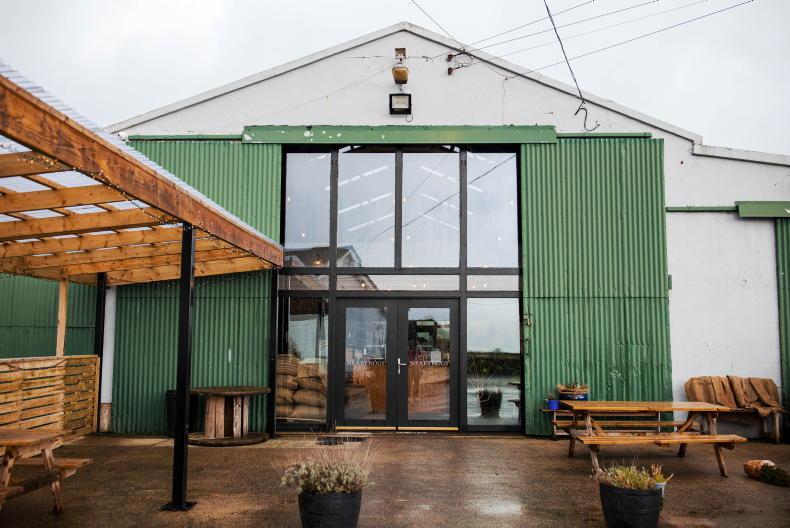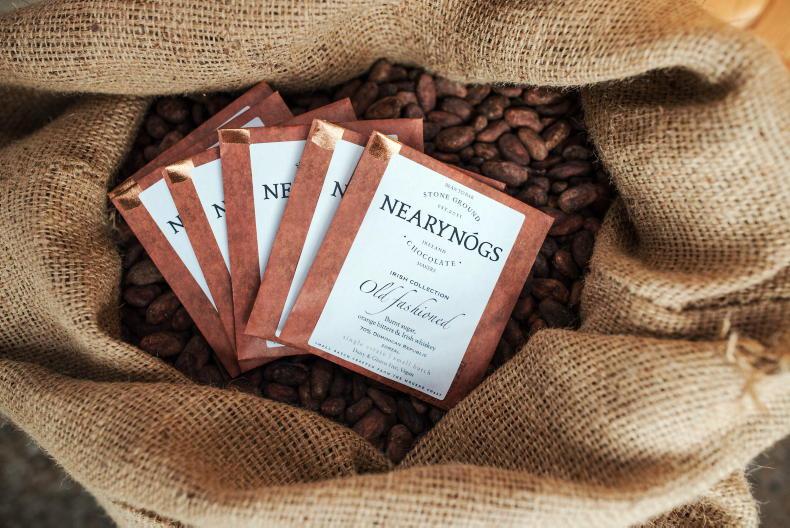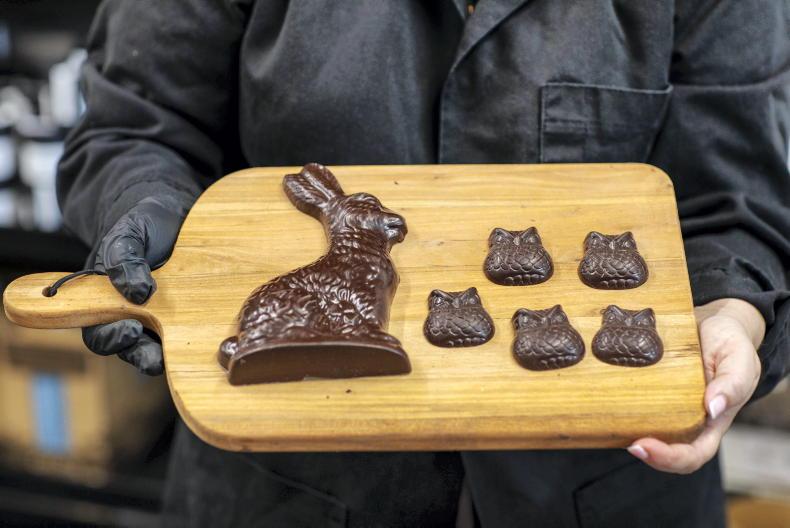These days, we hear the term “single origin” a lot; mainly in reference to coffee. It tells us the beans were grown in a single location – either on one farm, or on several small farms in the same cooperative or region.
Single origin takes in the idea of terroir; the specific environmental factors that make an area unique. A coffee bean grown in Ethiopia tastes differently to a bean grown in the rainforests of Colombia. A sauvignon blanc from France is different to one from New Zealand. The same goes for cocoa – the fruit from which all of our favourite chocolate treats originate.
In a world where chocolate is considered a commodity (and is often mixed with emulsifiers and other ingredients, like palm oil, before it reaches our lips), single origin craft chocolate provides an opportunity to appreciate cocoa’s many global flavour profiles.
NearyNógs
Driving along the picturesque Mourne coastal route to reach NearyNógs Stoneground Chocolate headquarters in Kilkeel, Co Down, I think about what brought Dorothy and Shane Neary on their single-origin chocolate journey. Parents of 12, they started their ethical bean-to-bar business in 2011 and say it was originally family reasons which made them go down the entrepreneurial road.
“We started because we were doing a fundraiser for a member of our family who was going to India to do charity work,” Shane recalls. “Dorothy and her mother happened to remember an old recipe for chocolate fudge that Dorothy’s grandmother used to make. So they decided to make that and they put it in little jars and took it straight to the fundraiser.
“Because of this, it became popular,” he continues. “If someone was getting married, they’d say, ‘That’s great chocolate, can you make it for my wedding in three months’ time?’ So we started making it for weddings, craft fairs, events, church halls and school fairs and we just got a lot of attention that way – more than what we would have expected.”
They decided to call their business NearyNógs after a series of children’s stories written by Shane’s father, Johnnie. These stories featured Shane and his siblings and took place in a fantasy land; similar to Tír na nÓg - it holds special significance for Shane.
The family
Around this time, their youngest daughter became ill. Dorothy and Shane were referred to Great Ormond Street Hospital in London, which specialises in rare childhood illnesses, and were told that her needs would be significant. To ensure they could put their daughter’s needs first, they decided to take a chance on their chocolate business and become their own bosses.
As they sold their chocolates, they noticed many were looking for dairy-free or gluten-free chocolate.

Dorothy and Shane converted an old potato farm into their chocolate factory \ Claire Nash
They were also hearing from people who were concerned about the ingredients in conventional chocolate and were looking for alternatives, with fewer additives. Dorothy and Shane decided to learn how to make chocolate from scratch to ensure both traceability and a quality product.
“We phoned a few companies to see if we could buy [raw] cocoa beans and no one would oblige,” Dorothy says. “They all said, ‘It’s too difficult – you don’t have the equipment. Don’t even try.’ Eventually, we found someone who would sell us a kilo of cocoa beans. We bought a few books, watched a lot of YouTube and phoned a few chocolate makers in the UK.
“We learned the basics the hard way,” she adds. “We used our oven at home. We burned a few cocoa beans, under-roasted a few cocoa beans and, eventually, we used a rolling pin and a hair dryer to separate the shells from the cocoa nibs.”
The space
As they continued to learn the bean-to-bar process, Dorothy and Shane also grew out of their home kitchen space; acquiring a warehouse location a few kilometres down the road. The additional space was great, but they soon grew out of this one, too, and realised they needed something even closer to home.
Initially, they were financing their business through credit cards (“I would never recommend financing your business with a credit card, but that’s what we did,” Shane laughs) and raised some funds from friends and family. In 2014, they met a Dutch investor through a mutual friend who felt passionately about the kind of work Dorothy and Shane were doing. This investor provided them with a loan for equipment and has also acted as a business mentor to the couple.
Spuds to nibs
In 2018, Shane and Dorothy acquired a new premises on a former potato farm, just steps from their home. This meant their work could continue uninterrupted, even when they had pressing family matters. During the pandemic, they also realised they needed to invest in staff. They opened a cafe and retail shop in the chocolate factory.
“Our daughter is 14 now and we’ve had a lot of interruptions and treatments over the years – I think she’s had probably 45 surgeries,” Shane says. “Before COVID, we had no full-time employees. Now we have six employees, so if we have to go away for treatments, we have that support system in place.”

For Shane and Dorothy, the ethics of chocolate are as important as the flavour and quality. They feel responsible to pay fairer prices for cocoa to help provide farmers with autonomy \ Claire Nash
Shane and Dorothy have also started to provide the public with educational tours. They show the chocolate-making process and emphasise the importance of responsible cocoa sourcing; explaining how some conventional chocolate manufacturers use exploitative methods (some have been even accused of child slavery) and do not pay farmers fairly for their labour. Their tours end with a chocolate tasting to explore the various origins?.
“To unpack the whole story, you have to unpack the past – about how chocolate has been treated and how the people in the process have also been treated, as a commodity,” Shane says. “It’s fine to say, ‘They live on the other side of the planet,’ but when you meet them and hear their stories you don’t have a choice; you have to do a better job.”
The farms
From the struggle of sourcing their first kilo, Dorothy and Shane have now established a regular supply of ethically-sourced cocoa beans from 14 single origins around the world. They continue to hand sort each cocoa bean before roasting, grinding and tempering the chocolate into their various bars and products and have won several awards which have recognised their commitment to people and the planet.
Shane says that while most global chocolate brands pay just €1 per kilo for cocoa, craft chocolate makers –like NearyNógs – pay from €5 to €10 per kilo. Unfortunately, craft chocolate makers only account for 1% of the chocolate industry.

You can puchase their regular line of chocolate products at their retail shop and in many other places, or purchase your Easter goodies \ Claire Nash
“We have a picture on our wall of a farmer named Abra, and she is from Togo,” he tells Irish Country Living. “Abra left her grandfather’s farm and moved to Belgium. After a few years, she felt she needed to go back to Togo and do something because women there are treated like second-class citizens. Her grandfather had passed away, so she took over his farm.
“She hired 130 women to come and work on her farm,” Shane continues. “She paid them a living wage. She sold cocoa to companies like us, not big industry ones, and this means she can pay her workers fairly. She has started a local school and is determined for these women to get everything they need – like day care – to keep their jobs.
“I think it’s about equal opportunities,” he adds. “You have to trust that if you give people opportunities, their natural talents will be given a chance to shine.”
See nearynogs.com for further information and to shop online.
Read more
JP McMahon has released a second book celebrating 12 years of Aniar restaurant
These friends are proving a small food business can thrive in rural Ireland
These days, we hear the term “single origin” a lot; mainly in reference to coffee. It tells us the beans were grown in a single location – either on one farm, or on several small farms in the same cooperative or region.
Single origin takes in the idea of terroir; the specific environmental factors that make an area unique. A coffee bean grown in Ethiopia tastes differently to a bean grown in the rainforests of Colombia. A sauvignon blanc from France is different to one from New Zealand. The same goes for cocoa – the fruit from which all of our favourite chocolate treats originate.
In a world where chocolate is considered a commodity (and is often mixed with emulsifiers and other ingredients, like palm oil, before it reaches our lips), single origin craft chocolate provides an opportunity to appreciate cocoa’s many global flavour profiles.
NearyNógs
Driving along the picturesque Mourne coastal route to reach NearyNógs Stoneground Chocolate headquarters in Kilkeel, Co Down, I think about what brought Dorothy and Shane Neary on their single-origin chocolate journey. Parents of 12, they started their ethical bean-to-bar business in 2011 and say it was originally family reasons which made them go down the entrepreneurial road.
“We started because we were doing a fundraiser for a member of our family who was going to India to do charity work,” Shane recalls. “Dorothy and her mother happened to remember an old recipe for chocolate fudge that Dorothy’s grandmother used to make. So they decided to make that and they put it in little jars and took it straight to the fundraiser.
“Because of this, it became popular,” he continues. “If someone was getting married, they’d say, ‘That’s great chocolate, can you make it for my wedding in three months’ time?’ So we started making it for weddings, craft fairs, events, church halls and school fairs and we just got a lot of attention that way – more than what we would have expected.”
They decided to call their business NearyNógs after a series of children’s stories written by Shane’s father, Johnnie. These stories featured Shane and his siblings and took place in a fantasy land; similar to Tír na nÓg - it holds special significance for Shane.
The family
Around this time, their youngest daughter became ill. Dorothy and Shane were referred to Great Ormond Street Hospital in London, which specialises in rare childhood illnesses, and were told that her needs would be significant. To ensure they could put their daughter’s needs first, they decided to take a chance on their chocolate business and become their own bosses.
As they sold their chocolates, they noticed many were looking for dairy-free or gluten-free chocolate.

Dorothy and Shane converted an old potato farm into their chocolate factory \ Claire Nash
They were also hearing from people who were concerned about the ingredients in conventional chocolate and were looking for alternatives, with fewer additives. Dorothy and Shane decided to learn how to make chocolate from scratch to ensure both traceability and a quality product.
“We phoned a few companies to see if we could buy [raw] cocoa beans and no one would oblige,” Dorothy says. “They all said, ‘It’s too difficult – you don’t have the equipment. Don’t even try.’ Eventually, we found someone who would sell us a kilo of cocoa beans. We bought a few books, watched a lot of YouTube and phoned a few chocolate makers in the UK.
“We learned the basics the hard way,” she adds. “We used our oven at home. We burned a few cocoa beans, under-roasted a few cocoa beans and, eventually, we used a rolling pin and a hair dryer to separate the shells from the cocoa nibs.”
The space
As they continued to learn the bean-to-bar process, Dorothy and Shane also grew out of their home kitchen space; acquiring a warehouse location a few kilometres down the road. The additional space was great, but they soon grew out of this one, too, and realised they needed something even closer to home.
Initially, they were financing their business through credit cards (“I would never recommend financing your business with a credit card, but that’s what we did,” Shane laughs) and raised some funds from friends and family. In 2014, they met a Dutch investor through a mutual friend who felt passionately about the kind of work Dorothy and Shane were doing. This investor provided them with a loan for equipment and has also acted as a business mentor to the couple.
Spuds to nibs
In 2018, Shane and Dorothy acquired a new premises on a former potato farm, just steps from their home. This meant their work could continue uninterrupted, even when they had pressing family matters. During the pandemic, they also realised they needed to invest in staff. They opened a cafe and retail shop in the chocolate factory.
“Our daughter is 14 now and we’ve had a lot of interruptions and treatments over the years – I think she’s had probably 45 surgeries,” Shane says. “Before COVID, we had no full-time employees. Now we have six employees, so if we have to go away for treatments, we have that support system in place.”

For Shane and Dorothy, the ethics of chocolate are as important as the flavour and quality. They feel responsible to pay fairer prices for cocoa to help provide farmers with autonomy \ Claire Nash
Shane and Dorothy have also started to provide the public with educational tours. They show the chocolate-making process and emphasise the importance of responsible cocoa sourcing; explaining how some conventional chocolate manufacturers use exploitative methods (some have been even accused of child slavery) and do not pay farmers fairly for their labour. Their tours end with a chocolate tasting to explore the various origins?.
“To unpack the whole story, you have to unpack the past – about how chocolate has been treated and how the people in the process have also been treated, as a commodity,” Shane says. “It’s fine to say, ‘They live on the other side of the planet,’ but when you meet them and hear their stories you don’t have a choice; you have to do a better job.”
The farms
From the struggle of sourcing their first kilo, Dorothy and Shane have now established a regular supply of ethically-sourced cocoa beans from 14 single origins around the world. They continue to hand sort each cocoa bean before roasting, grinding and tempering the chocolate into their various bars and products and have won several awards which have recognised their commitment to people and the planet.
Shane says that while most global chocolate brands pay just €1 per kilo for cocoa, craft chocolate makers –like NearyNógs – pay from €5 to €10 per kilo. Unfortunately, craft chocolate makers only account for 1% of the chocolate industry.

You can puchase their regular line of chocolate products at their retail shop and in many other places, or purchase your Easter goodies \ Claire Nash
“We have a picture on our wall of a farmer named Abra, and she is from Togo,” he tells Irish Country Living. “Abra left her grandfather’s farm and moved to Belgium. After a few years, she felt she needed to go back to Togo and do something because women there are treated like second-class citizens. Her grandfather had passed away, so she took over his farm.
“She hired 130 women to come and work on her farm,” Shane continues. “She paid them a living wage. She sold cocoa to companies like us, not big industry ones, and this means she can pay her workers fairly. She has started a local school and is determined for these women to get everything they need – like day care – to keep their jobs.
“I think it’s about equal opportunities,” he adds. “You have to trust that if you give people opportunities, their natural talents will be given a chance to shine.”
See nearynogs.com for further information and to shop online.
Read more
JP McMahon has released a second book celebrating 12 years of Aniar restaurant
These friends are proving a small food business can thrive in rural Ireland









 This is a subscriber-only article
This is a subscriber-only article











SHARING OPTIONS: